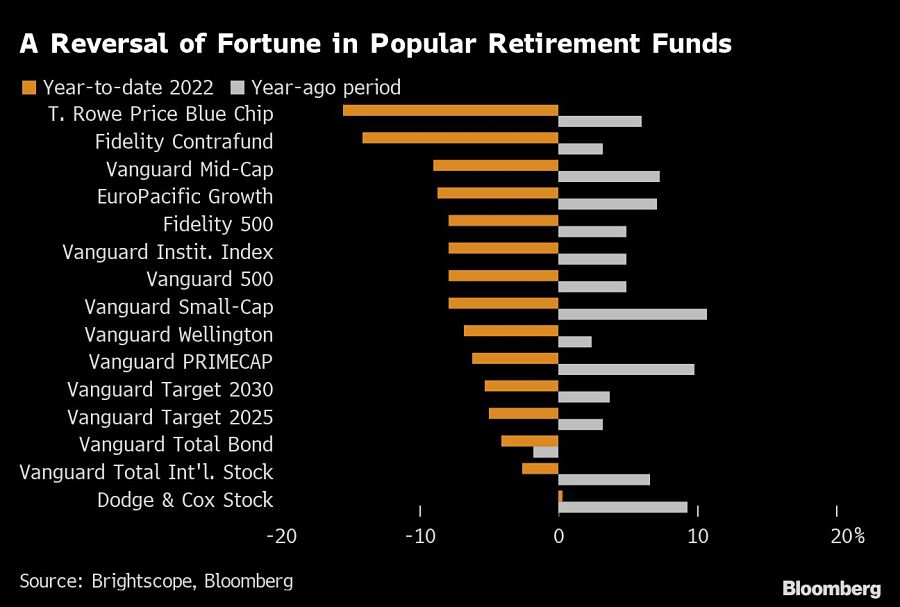

Retirement savers entered 2022 with average 401(k) balances at a record high. In just a few weeks, the return tables have reversed on many of the largest retirement funds.
A look at the 15 largest funds held in 401(k) plans, as measured by data firm BrightScope Inc., shows that only one has a positive return — barely — for the year as of Feb. 17. The top performer, Dodge & Cox Stock, is up 0.3%. At this time last year, only one of the 15 was negative, the Vanguard Total Bond Market Index Fund, down 1.8%.

Dodge & Cox Stock’s 0.3% gain is a far cry from its performance at this time last year, when it was up 9.3%. That made it the third-best performing fund of the bunch back then, after Vanguard PRIMECAP’s 9.8% return and Vanguard Small-Cap’s nearly 11% gain.
Dodge & Cox Stock takes a far more value-oriented approach than many of the largest equity funds in 401(k)s. While it has a big slug of financials, it also contains a hot technology stock among its top 10 holdings — Alphabet Inc. is its third-largest position, at 3.8% as of Dec. 31. The fund’s largest positions are Wells Fargo & Co., at 4.3% of assets, and Charles Schwab Corp., at 4.2%.
The biggest loss so far this year among the retirement fund giants? That’s in the T. Rowe Price Blue Chip Growth Fund, which is down 15.5%. It’s taken a hit from its exposure to large tech companies, which are all in the red as the prospect of Federal Reserve rate hikes makes the future earnings of growth stocks less appealing. The fund's top five holdings are Microsoft Corp., Amazon.com Inc., Alphabet, Apple Inc. and Meta Platforms Inc., all of which are down more than 5% this year, with Meta slumping nearly 40%.
The average 401(k) balance at the beginning of the year was $130,700, according to the latest data from Fidelity Investments.

Driven by robust transaction activity amid market turbulence and increased focus on billion-dollar plus targets, Echelon Partners expects another all-time high in 2025.

The looming threat of federal funding cuts to state and local governments has lawmakers weighing a levy that was phased out in 1981.

The fintech firms' new tools and integrations address pain points in overseeing investment lineups, account monitoring, and more.

Canadian stocks are on a roll in 2025 as the country prepares to name a new Prime Minister.

Carson is expanding one of its relationships in Florida while Lido Advisors adds an $870 million practice in Silicon Valley.
RIAs face rising regulatory pressure in 2025. Forward-looking firms are responding with embedded technology, not more paperwork.
As inheritances are set to reshape client portfolios and next-gen heirs demand digital-first experiences, firms are retooling their wealth tech stacks and succession models in real time.
